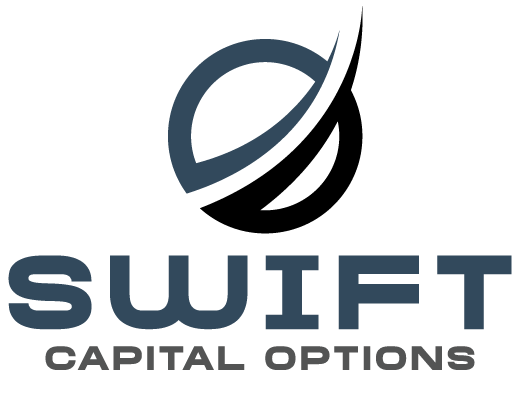Understanding Loan Requirements: A Comprehensive Guide


At Swift Capital Options, we believe that understanding loan requirements is crucial for businesses seeking financing. This knowledge not only increases your chances of approval but also helps you prepare effectively and choose the right loan product. Let's break down the common eligibility criteria and lender expectations to give you a clear picture of what's typically required.
General Eligibility Criteria
While specific requirements can vary by lender and loan type, here are some common eligibility factors:
- Time in Business
- Most lenders require at least 1-2 years of operation
- Startups may face more stringent requirements or need to explore specialized financing options
- Annual Revenue
- Minimum annual revenue requirements often range from $50,000 to $250,000
- Higher loan amounts typically require higher revenue thresholds
- Credit Score
- Personal credit scores of business owners are often considered
- Minimum scores typically range from 600 to 700, depending on the lender and loan type
- Business credit scores may also be evaluated for established businesses
- Profitability
- Many lenders want to see a history of profitability or a clear path to profitability
- Consistent cash flow is often more important than high profits
- Debt-to-Income Ratio
- Lenders assess your ability to take on additional debt
- A lower debt-to-income ratio is preferable, typically below 43-50%
- Industry
- Some lenders have restrictions on certain industries
- High-risk or heavily regulated industries may face additional scrutiny
Financial Documentation
Lenders typically require the following financial documents:
- Business tax returns (2-3 years)
- Personal tax returns of owners (2-3 years)
- Business financial statements (income statement, balance sheet, cash flow statement)
- Bank statements (3-6 months)
- Accounts receivable and payable aging reports
- Business debt schedule
Pro Tip: Keeping your financial records up-to-date and organized can significantly speed up the application process.
Business Plan and Projections
Many lenders, especially for larger loans, will expect:
- A comprehensive business plan
- Financial projections for the next 2-5 years
- Clear explanation of how the loan will be used and repaid
Key Focus: Your business plan should clearly demonstrate how the loan will contribute to your business growth and improved financial performance.
Collateral and Guarantees
For secured loans:
- Lenders will assess the value and liquidity of offered collateral
- Common forms include real estate, equipment, inventory, or accounts receivable
- Personal guarantees from business owners are often required, especially for smaller businesses
Important Note: Understand the risks associated with pledging collateral or offering personal guarantees.
Industry-Specific Requirements
Some industries may face additional requirements:
- Licenses and certifications
- Compliance with industry regulations
- Industry-specific financial ratios or benchmarks
Lender-Specific Criteria
Different types of lenders may have unique requirements:
Traditional Banks
- Often have the strictest criteria
- May require longer time in business and higher credit scores
- Typically offer lower interest rates for those who qualify
SBA Loans
- Follow Small Business Administration guidelines
- May have more flexible criteria but require extensive documentation
- Often preferred for their favorable terms and larger loan amounts
Online Lenders
- Generally have more flexible criteria
- May approve loans based on cash flow rather than credit score
- Often offer faster approval but at higher interest rates
Alternative Lenders
- Most flexible criteria, suitable for businesses that don't qualify elsewhere
- May consider alternative data points beyond traditional financials
- Typically charge higher interest rates to offset increased risk
Common Reasons for Loan Denials
Understanding these can help you address potential issues:
- Insufficient cash flow
- Low credit score
- Too much existing debt
- Lack of collateral (for secured loans)
- Inadequate business plan or projections
- Industry risks or economic concerns
- Incomplete or inaccurate application
Preparing to Meet Loan Requirements
To position your business favorably:
- Improve Your Credit: Both business and personal credit scores matter.
- Strengthen Your Financials: Focus on improving profitability and cash flow.
- Organize Your Documents: Have all required paperwork ready and up-to-date.
- Develop a Solid Business Plan: Clearly articulate your business model and growth strategy.
- Build Business Credit: Establish and maintain good relationships with suppliers and creditors.
- Consider Your Timing: Apply when your business is showing strong, consistent performance.
- Be Realistic: Choose loan products that align with your business's current financial situation.
How Swift Capital Options Can Help You Navigate Loan Requirements
Understanding and meeting loan requirements can be complex. Here's how we can assist:
- Requirement Analysis: We'll help you understand the specific requirements for different loan types and lenders.
- Financial Assessment: We can review your financials to identify strengths and areas for improvement.
- Application Preparation: We'll guide you in assembling a strong, complete loan application package.
- Lender Matching: Our knowledge of various lenders' criteria helps us connect you with the best options for your situation.
- Alternative Solutions: If traditional loans aren't a fit, we can explore alternative financing options.
- Ongoing Advice: We provide guidance on improving your business's financial profile for future financing needs.
Your Next Steps
Ready to pursue financing for your business? Here's how to proceed:
- Assess your current financial situation against common loan requirements.
- Identify any areas where your business might fall short and develop a plan to address them.
- Gather and organize all necessary financial documents.
- Contact Swift Capital Options for a personalized consultation to discuss your financing needs and options.
Remember, meeting loan requirements is about more than just qualifying for financing—it's about positioning your business for long-term financial success. By understanding and preparing for these requirements, you're taking a crucial step towards securing the capital your business needs to thrive.
Are you ready to navigate the loan application process with confidence? Reach out to Swift Capital Options today. Let's work together to assess your readiness, identify the best financing options for your business, and develop a strategy to meet lender requirements. With our expertise guiding you, you can approach the lending process prepared and positioned for success. Your business's financial future is important – let's ensure you have the tools and knowledge to secure the funding you need!




